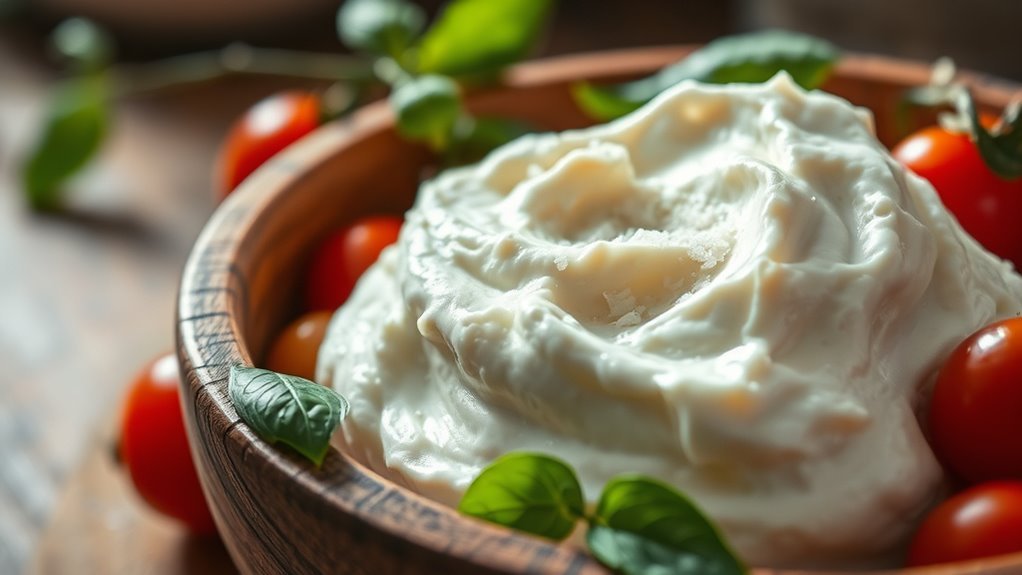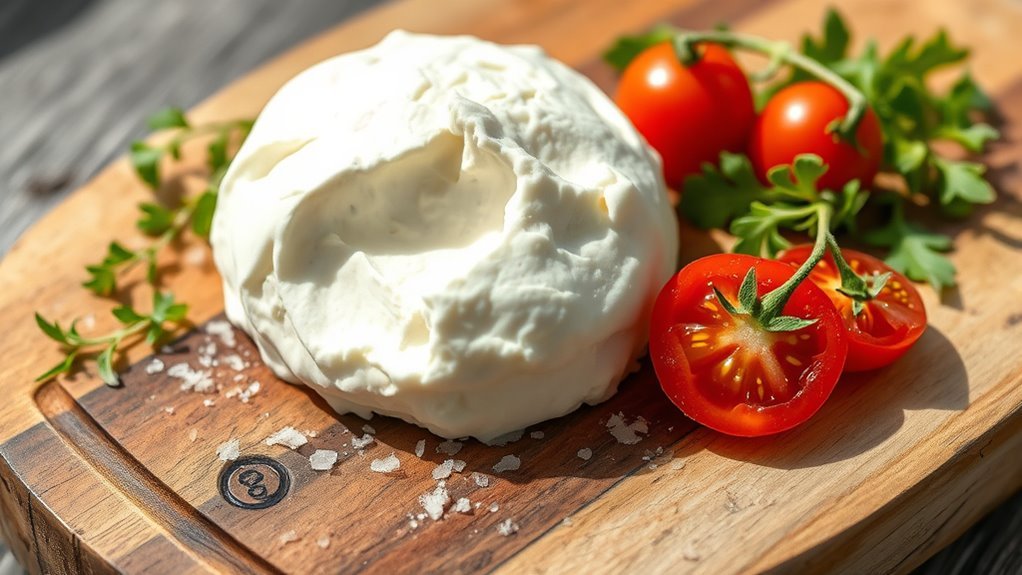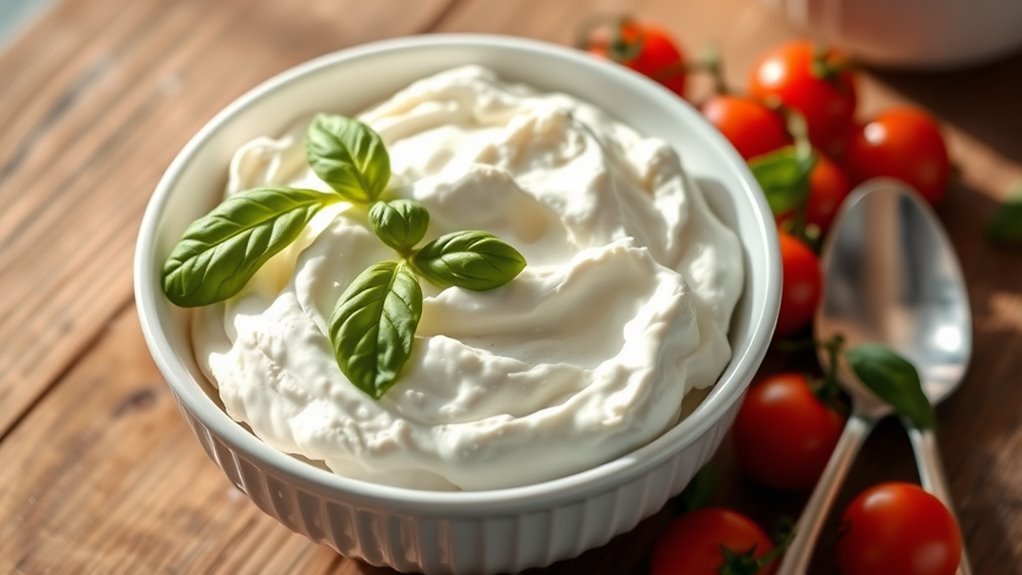Yes, ricotta cheese can be keto-friendly. With approximately 6 grams of carbs per half-cup serving, it offers a good balance of protein and calcium without exceeding your daily carb limits. Whole milk and part-skim ricotta options provide versatility in your meals. Compared to other cheeses like cheddar or cream cheese, ricotta can fit well into a keto diet. If you’re curious about incorporating ricotta into your meal plan, there are plenty of tasty recipes to explore.
Nutritional Profile of Ricotta Cheese

When assessing whether ricotta cheese fits into a keto diet, it is vital to examine its nutritional profile. Originating from Italy, ricotta is made from whey left over from cheese production, leading to its creamy texture. There are various ricotta varieties, including whole milk, part-skim, and goat ricotta, each offering different flavors and fat contents. Typically, ricotta is rich in protein and calcium, making it a nutritious option. However, its carbohydrate content varies based on the type and brand, which is significant to evaluate on a keto diet. By exploring these aspects, you can make an informed choice about incorporating ricotta into your meals while enjoying the flexibility and freedom that a keto lifestyle offers.
Carb Content in Ricotta

Understanding the carbohydrate content in ricotta is key to determining how it fits into your keto diet. Ricotta typically contains about 6 grams of carbs per half-cup serving, which can be manageable within your daily carb limit. This creamy cheese offers ricotta benefits like protein and calcium, making it a nutritious choice. However, if you’re looking to reduce carbs further, you might consider ricotta substitutes such as cottage cheese or cream cheese, which can offer similar textures with varying carb counts. Always check the labels, as brands may differ. Balancing ricotta’s delicious versatility with your keto goals can help you enjoy your meals while staying on track with your dietary preferences.
Comparing Ricotta to Other Cheeses

When comparing ricotta to other cheeses, it’s important to look at their nutritional profiles and carbohydrate content. While ricotta is relatively moderate in carbs, other cheeses like cheddar or mozzarella may offer lower carb options. Understanding these differences can help you make informed choices for a keto-friendly diet.
Nutritional Profile Comparison
Although ricotta cheese is often celebrated for its creamy texture and versatility, it’s vital to compare its nutritional profile with other cheeses to determine its suitability for a keto diet. Ricotta varieties can differ markedly; for instance, part-skim ricotta tends to have fewer calories and fat than whole milk versions. When you look at other cheeses like cream cheese or cheddar, they generally offer higher fat content and lower carbs, making them more appealing for keto enthusiasts. For serving suggestions, ricotta pairs beautifully with low-carb veggies or can be used in keto-friendly desserts, but it’s essential to keep track of portion sizes. So, understanding these nuances can help you make informed choices that align with your keto goals.
Carbs in Various Cheeses
Cheeses vary considerably in their carbohydrate content, which is essential for anyone following a keto diet. Understanding the carb counts in different cheese varieties can help you make informed choices. Here’s a quick comparison:
- Ricotta: About 6 grams of carbs per 100 grams.
- Cheddar: Roughly 1-2 grams of carbs per 100 grams.
- Mozzarella: Approximately 2-3 grams of carbs per 100 grams.
- Cream Cheese: Around 4 grams of carbs per 100 grams.
Benefits of Ricotta on a Keto Diet
Ricotta cheese can be a great addition to your keto diet, primarily due to its low carbohydrate content. It’s also a nutrient-dense option, providing essential vitamins and minerals without loading up on carbs. This makes it easier for you to meet your dietary goals while enjoying a versatile ingredient.
Low Carb Content
When considering low-carb options for a keto diet, ricotta cheese stands out due to its relatively low carbohydrate content compared to many other dairy products. With about 6 grams of carbs per half-cup serving, it’s a great addition to your meals and keto desserts. Here are some benefits of incorporating ricotta into your diet:
- Satisfies cravings without the carb overload.
- Versatile in both savory dishes and sweet treats.
- A fantastic alternative to heavier cheeses or ricotta alternatives.
- Helps maintain ketosis while enjoying creamy textures.
Nutrient Dense Option
In addition to its low carb content, ricotta cheese offers a wealth of nutrients that can enhance your keto diet. Packed with protein, calcium, and healthy fats, ricotta benefits your overall health and supports muscle maintenance. The presence of calcium aids in nutrient absorption, which is essential for those on a restrictive diet. Furthermore, ricotta contains vitamins A and B12, promoting energy and immune function. Its creamy texture makes it a versatile ingredient, allowing you to enjoy it in various dishes without compromising your dietary goals. By incorporating ricotta into your meals, you can enjoy not just its delicious taste but also its nutritional advantages, making your keto journey more satisfying and effective.
Delicious Keto-Friendly Ricotta Recipes
If you’re following a keto diet, incorporating ricotta into your meals can add both creaminess and flavor without compromising your carb count. Here are four delicious keto-friendly ricotta recipes to try:
- Savory Ricotta Stuffed Peppers – Fill bell peppers with a mixture of ricotta, spinach, and spices for a satisfying meal.
- Ricotta Pancakes – Whip up fluffy pancakes using ricotta for breakfast, topped with low-carb berries.
- Keto Ricotta Cheesecake – Indulge in a creamy ricotta dessert that satisfies your sweet tooth without the carbs.
- Savory Ricotta Dip – Blend ricotta with herbs and spices for a perfect dip to enjoy with veggies.
These recipes showcase ricotta’s versatility while keeping your keto goals in check!
Tips for Incorporating Ricotta Into Your Keto Meal Plan
How can you seamlessly integrate ricotta into your keto meal plan? Start by using it as a creamy base for sauces or mixed into scrambled eggs for a protein boost. Ricotta pairs beautifully with low-carb vegetables like spinach or zucchini, making it a versatile addition to your meals. For meal prep, consider making ricotta-stuffed peppers or lasagna using zucchini noodles instead of traditional pasta. You can also whip ricotta with herbs and spices for a flavorful dip—perfect for snacking. Don’t forget to experiment with sweet options too; mix it with berries for a satisfying dessert. With these tips, you’ll enjoy the creamy goodness of ricotta while staying true to your keto goals!
Frequently Asked Questions
Can I Eat Ricotta Cheese Daily on Keto?
Sure, you can eat ricotta cheese daily on keto—if you’re into living life on the edge! Just remember, moderation is key. Ricotta offers nutritional benefits like protein and calcium, but it’s still important to practice portion control. Too much can sneak in extra carbs. Enjoy it in your meals, but balance it with other keto-friendly foods. So, go ahead and indulge, just keep an eye on those serving sizes!
Is Ricotta Cheese Suitable for Lactose Intolerant Individuals?
Ricotta cheese can be a challenge for lactose intolerant individuals, as it contains lactose, which might trigger symptoms like bloating and stomach cramps. However, some find they can tolerate small amounts. If you’re concerned, consider ricotta cheese alternatives like almond or cashew cheese, which are lactose-free and provide a similar texture. Always listen to your body and choose what works best for you to enjoy your meals without discomfort.
How to Store Ricotta Cheese Properly?
To store ricotta cheese properly, keep it in its original container and tightly seal it after each use. Curiously, ricotta cheese has a shelf life of about five to seven days once opened. For ideal ricotta cheese storage, place it in the fridge and avoid leaving it out at room temperature. If you notice any off smells or discoloration, it’s best to discard it to guarantee your safety and enjoyment.
Does Ricotta Cheese Contain Additives or Preservatives?
Yes, some ricotta cheese can contain additives and preservatives, depending on the brand and type. While many artisanal or fresh varieties may only include milk, vinegar, and salt, processed versions might have stabilizers or preservatives to extend shelf life. It’s important to read labels if you’re concerned about ricotta additives or preservatives. Choosing high-quality, organic brands can help you avoid unwanted ingredients and enjoy a more natural product.
Can Ricotta Cheese Be Frozen for Later Use?
Absolutely, you can freeze ricotta cheese for later use! Think of it as preserving a summer garden’s bounty for winter’s chill. Using proper freezing techniques, like portioning it into airtight containers or freezer bags, guarantees its creamy texture remains intact. When it’s time to use your ricotta storage, simply thaw it in the fridge overnight. While some texture changes may occur, it’ll still be a delicious addition to your meals!
Is ricotta cheese keto-friendly?
Yes, ricotta cheese can be considered keto-friendly. It is relatively low in carbohydrates compared to other cheeses, making it suitable for a ketogenic diet. One cup of whole milk ricotta contains approximately 6-8 grams of carbs. However, portion control is essential, so it’s best to consume it in moderation as part of your overall daily carb limit.
What is the carb content of ricotta cheese?
The carb content in ricotta cheese varies depending on the type. On average, whole milk ricotta has about 6-8 grams of carbohydrates per cup, while part-skim ricotta contains slightly fewer carbs. It’s important to check the nutritional label for the specific brand you choose, as variations may exist.
Can I use ricotta cheese in keto recipes?
Absolutely! Ricotta cheese can be a versatile ingredient in keto recipes. It can be used in dishes like lasagna (using zucchini slices instead of pasta), pancakes, or as a filling for keto-friendly pastries. Its creamy texture and mild flavor can enhance many dishes while keeping carb counts low.
Are there any alternatives to ricotta cheese on a keto diet?
Yes, there are several alternatives to ricotta cheese that are also keto-friendly. Cream cheese, mascarpone, and cottage cheese can serve as substitutes in various recipes. These alternatives often have similar textures and flavors and can help you maintain your ketogenic lifestyle without sacrificing taste.
Is ricotta cheese high in fat?
Ricotta cheese is moderate in fat, with approximately 15-20 grams of fat per cup of whole milk ricotta. This makes it a suitable option for a ketogenic diet, which emphasizes higher fat intake. However, if you are watching your fat consumption, you may opt for part-skim ricotta, which contains less fat but still offers a creamy texture.
References
- https://www.healthline.com/nutrition/ricotta-cheese-keto
- https://www.ncbi.nlm.nih.gov/pmc/articles/PMC6473219/
- https://www.medicalnewstoday.com/articles/324587
- https://www.wisewell.com/blogs/news/is-ricotta-cheese-keto-friendly
- https://www.dietdoctor.com/low-carb/recipes/keto-ricotta-cheese
- https://www.ketogenic.com/ketogenic-diet-food-list/
- https://www.aicr.org/resources/blog/what-is-the-keto-diet/
- https://www.thepaleodiet.com/keto-diet/


